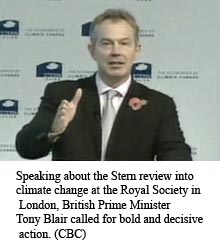Europe fears disaster in climate change
 London, UK - Warned Monday that failure to act swiftly on global warming will have a cataclysmic effect on the global economy, and said it was stepping up efforts to get other nations involved.
London, UK - Warned Monday that failure to act swiftly on global warming will have a cataclysmic effect on the global economy, and said it was stepping up efforts to get other nations involved. A long-awaited report predicted apocalyptic effects from climate change, including droughts, flooding, famine, skyrocketing malaria rates and the extinction of many animal species. These will happen during the current generation if changes are not made soon, the report said.
It said the costs related to climate change, if it is allowed to continue unmitigated, could devour as much as 20 percent of the world’s gross domestic product, or GDP.
“The consequences for our planet are literally disastrous,” Prime Minister Tony Blair of Britain said in a speech discussing the report, which is one of the most comprehensive attempts yet to predict the economic impact of global warming.
“This disaster is not set to happen in some science-fiction future, many years ahead, but in our lifetime,” Blair said. “What is more, unless we act now, not some time distant but now, these consequences, disastrous as they are, will be irreversible.”
On the other hand, success in slowing carbon emissions could bring great savings to the world economy, possibly in the range of $2.5 trillion a year, the report estimated. This emphasis seems aimed at the few industrial nations, including the United States, that have refused to sign up to initiatives like the Kyoto Protocol, citing economic reasons.
President George W. Bush has called the Kyoto Protocol “unrealistic” and its emissions targets arbitrary, arguing that they are not good for America because they would crimp the economy, causing layoffs and price increases. Many American businesses resist mandatory caps on greenhouse gas emissions.
The news conference with Blair and the chancellor of the Exchequer, Gordon Brown, who hopes to succeed the prime minister, sought to reinforce the impression that the governing Labour Party is committed to acting on the challenge.
Britain intends that “the report should be discussed as widely as possible throughout the world - not just among governments but among international institutions, business leaders, NGOs and civil society,” Brown said. He also said he had appointed the former U.S. vice president Al Gore as an adviser on environmental issues.
“The justification for taking prompt action now is overwhelming compared with the long-term alternatives,” said Alden Meyer, director of strategy and policy at the Union of Concerned Scientists, an American nonprofit group. “Of course, the question is whether that argument will have any resonance in the White House,” he said.
The level of greenhouse gases in the atmosphere is about 430 parts per million, compared with 280 before the Industrial Revolution. Stabilizing that number between 450 and 550 could cost about 1 percent of GDP. But failing to limit the growth to that range could cost 5 percent to 20 percent of GDP a year, the report concluded.
The 700-page report was compiled by Nicholas Stern, the head of the British government’s economic service and a former chief economist of the World Bank. It evaluated a body of scientific studies of global warming from an economic perspective.
If the sources of greenhouse gases continue unchecked, average temperatures could rise by 2 to 3 degrees Celsius in the next 50 years, the report says. By comparison, during the last Ice Age, temperatures were just 5 degrees Celsius cooler than they are now.
A 2-to-3-degree increase in average temperatures could leave one-sixth of the world’s population facing floods or droughts. It could reduce crop production in Africa enough to put several hundred million people at risk of starvation.
Almost half of the world’s land animals could face extinction, the report argued. An additional degree increase after that and cities like New York, Tokyo, London and St. Petersburg would be at constant risk of flooding.
Martin Rees, president of the Royal Society, a centuries-old British scientific group that counts Isaac Newton among its former members, said the study “should be a turning point in a debate which has pitted short-term economic interests against long-term costs to the environment, society and the economy.”
Britain produces 2 percent of the world’s greenhouse gasses, but has been one of the loudest voices on global warming and established some of the world’s most punitive taxes on carbon emissions.
Britain has already met its Kyoto emissions reductions targets, but most European nations are struggling to reduce the emission of greenhouse gases by 8 percent by 2012. A UN report issued Monday said greenhouse gas emissions of industrial nations that are part of the UN panel on climate change increased 11 percent between 1990 and 2004.
Those figures do not include east and central European countries, which saw a rapid decline in emissions during that time.
Joint emissions of the countries that have joined the Kyoto Protocol were 15.3 percent lower in 2004 than in 1990, but individual performance varied.
You can return to the main Market News page, or press the Back button on your browser.

